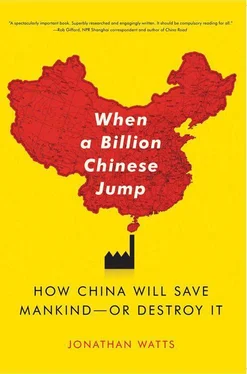The venue for the Jaguar Gorgeous Award Party was a renovated mansion off Huaihai Road, just a few minutes’ walk away from the Barbie store. In cocktail dresses and designer suits, the guests sipped wine in the courtyard, waiting for VIPs to show up, sign the visitor board, have their photographs taken, and be whisked off for a sales pitch for the new 5-liter XKR.
“It is a wow car!” gushed an exquisitely attired PR lady who introduced herself by her Westernized name, Seraph.
I was skeptical. “But you can barely move in Shanghai’s traffic. Why would anyone want such a huge engine?”
“Rich people never take the subway. Even if the traffic is bad, they need a car,” said Seraph, smiling, clearly deep into her role. “Jaguar is nothing but gorgeous and beautiful.”
The description would fit and delight Cindy, who arrived soon after and introduced me to the affable head of the Porsche Club, Li Mingtan. They briefly inducted me into the world of luxury car owners, explaining how the group went driving every weekend to their second homes in the countryside. At times, they also operated as what might be called a rent-a-snob organization, by parking their luxury cars outside branding events. At times this was political. For the tenth anniversary of the Hong Kong handover, Li told me he led a 100-Porsche convoy down to the former British territory to demonstrate the mainland’s rising consumer power.
It was a fair statement to make. In the five years before 2009, sales of luxury cars rose fivefold, deluxe villas soared sevenfold, and sales of luxury goods tripled. 17This was just the start of a spending splurge. The number of wealthy households was forecast to double again between 2010 and 2015. 18
Li did not seem entirely happy that luxury cars had lost their exclusive cachet. He was one of the first people in Shanghai to buy a Porsche in 2005. Now he said there were more than a thousand on the city’s streets. It was a similar story for Bentleys and Ferraris. 19Keeping ahead of the pack was getting harder. He told me he had recently upgraded from a 3-liter to a 4.5-liter engine.
The Jaguar promotion was not going well. It was too hot. The air-conditioning did not appear to be working and several VIPs grumbled there was nothing to eat but canapés. The live classical music ought to have soothed the audience, but there was a problem with the sound system. Guests held their ears as the shrieking, squealing feedback continued through a speech by the company’s chief representative. The tuttutting was not as loud but probably hurt the ears of the organizers more.
“It’s all so superficial,” complained a guest from a European embassy. A friend nodded in agreement. I wondered what more they expected.
Consumption was increasingly equated in China with power and prestige. It was not always so. During the Mao era, frugality was a necessity as well as a virtue. Recently, however, conspicuous splurging had become an essential part of the zeitgeist of Shanghai. Taken to excess, it was comical. As the rich used their wealth to keep up with the Joneses, everyone ended up buying the same brands in the same places.
The retail market was becoming less diverse the bigger it grew. Paul French, a marketing consultant at the Shanghai-based Access Asia firm, told me the problem was Potemkin shopping communities designed to create the image of a good life that did not reflect the reality of most people: “They are building more and more malls filled with luxury brands. Like the power stations in Soviet-era Russia, they are being built not because of demand but because of prestige. Every official in China wants one to show their city is on the international map.”
These shopping emporiums aimed to generate desire rather than meet needs. Many were scathingly dismissed by locals as gui gouwu zhongxin (ghost malls) because they attracted so few customers. Yet these consumer citadels were everywhere. I saw one in Nanjing Road, the former center of the Shanghai retail experience. Like Carnaby Street in London, it had become a pedestrianized parade for tourists and migrants. Locals would not be seen dead there, though the shops contained many of the same brands as supposedly more upmarket spots. I saw them too at Xujiahui intersection, which was ringed by six department stores. Among them was the Orient Shopping Mall, a glass-and-marble monument to spiritual emptiness. Its brands were as predictable as a McDonald’s menu: Tag Heuer watches, Folli Follie jewelry, Estée Lauder cosmetics, Rolex watches, Dunhill belts, Kanebo lipstick, Mont Blanc sunglasses, Cartier pens, Dior lipstick, and other high-priced sameness. Passing through the revolving door on a weekday midmorning, I could not see a single other customer. Not even a window shopper.
Outside the polished exterior, under a limpid gray sky, crowds wandered past a Kentucky Fried Chicken outlet, a Coca-Cola promotion tent, a silver pillar dressed up as an Asahi beer can, and the slogan of the Shanghai Expo, “Better City, Better Life.”
I wandered under the overpasses and walkways, past the multistory car parks and shopping malls, glimpsing Premiership football on plasma TV screens, inhaling the traffic, and sucking in the capitalized mantras on the advertising billboards: “Beauty Redefined,” “Discover the Flavors of the World,” “It’s the Small Surprises That Touch the Most,” “Romance Comes from Little Moments,” “Please Follow Us,” “Good News to Beef Lovers.”
I could have been anywhere. The feelings of familiarity and alienation were borderless. China had joined the party. We were all having a great time, but we were in denial.
There were more of us than ever before and we had never lived longer. We were traveling farther—millions of us covered more ground every year than Marco Polo could have dreamed of in his lifetime. We were burning more carbon and calories—the average human used the energy equivalent of twenty human slaves. 20And we were eating more—middle-class city dwellers could dine each day on more exotic banquets than any king of old.
Bulging waistlines, expanding landfill sites, and the buildup of toxins in the air and water were not the only reasons this could not last. The Earth-watch Institute estimates that if China’s 1.3 billion people were to consume at the same rate as Americans, global production of steel, paper, and cars would have to double, oil output would need to rise by 20 million barrels per day, and miners would have to dig an extra 5 billion tons of coal. If they followed the U.S. appetite, China would chew its way through 80 percent of current meat production and two-thirds of the global grain harvest. 21
“China is telescoping history. It forces us to focus on what happens when huge numbers of low-income people rise rapidly in affluence,” Lester Brown, the president of Earthwatch, told me. “Chinese consumption shows the need to reconstruct the world economy.” But the opposite was happening. Global corporations and the communist government were together trying to make China the greatest shopper of them all. 22
The final stage of my social climb was to the peak of consumer society, where I met the woman who spearheaded that marketing campaign in its earliest stages.
Kan Yue-Sai literally changed the face of China, or at least the female half of it. Born in China, brought up in the U.S., she uniquely rose to fame on both sides of the Pacific as a TV star, an advertising pioneer, and China’s first cosmetics queen. She put the first artificial blush on the cheeks of tens of millions of women. Her cosmetics painted their lips, penciled their eyes, established the foundation for generations of Chinese women to look more Western. The finishing touch was a trademark hairstyle—a bob—that is even today known in hairdressing salons across the country as the “Yue-Sai cut.”
Читать дальше










